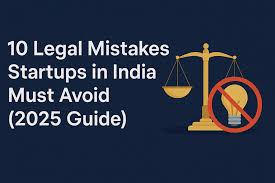Why Every Startup Needs Legal Counsel Early
Starting a new business venture is an exciting journey filled with endless possibilities and opportunities. However, amidst the enthusiasm and drive to succeed, many startups overlook a critical aspect that could determine their fate: legal counsel. Legal mistakes kill more startups than competition ever will. This statement might seem harsh, but it underscores a reality that many entrepreneurs face when their vision is clouded by neglecting proper legal guidance from the outset.
The early stage of a startup is a crucial window during which foundational decisions are made—decisions that profoundly affect the company's structure, governance, and long-term viability. Issues related to contracts, equity splits, intellectual property ownership, and investor relations require meticulous legal scrutiny and strategic planning. Engaging experienced legal counsel early can save startups from years of expensive and complicated cleanup later, allowing founders to focus on growth rather than crisis management.
The High Risk of Legal Mistakes in Startups
Many startups fall victim to legal pitfalls because they underestimate the complexities of business law and overestimate their ability to navigate these waters on their own. Common legal mistakes include informal or poorly drafted contracts, unclear equity ownership among founders, inadequate protection of intellectual property (IP), and neglecting compliance with regulatory requirements. Such oversights often lead to disputes, loss of investor trust, or even forced shutdowns.
According to various studies and reports, legal issues contribute significantly to the failure rate of new businesses, often more than market competition or financial mismanagement. These legal troubles can manifest at any stage but are particularly devastating if they arise after significant investment or once customer trust has been built. Early legal counsel helps anticipate and mitigate these risks by establishing a strong legal foundation.
Key Legal Areas Every Startup Should Address Early
There are several critical legal areas where early intervention can make all the difference for startups:
- Contracts: From agreements with co-founders, employees, contractors, suppliers, to customers—each contract must be clear, comprehensive, and legally enforceable. Early legal assistance ensures that these agreements protect the startup’s interests and reduce ambiguity.
- Equity Splits: How ownership is divided among founders can be a major source of conflict if not handled transparently and with legal rigor. Legal counsel can help draft founders’ agreements that address vesting, rights, and responsibilities.
- Intellectual Property Ownership: Startups often rely on unique ideas, products, or technologies. Protecting IP through patents, trademarks, copyrights, or trade secrets early prevents disputes that could jeopardize competitive advantages.
- Investor Relations: Proper legal frameworks are essential when raising funds. Term sheets, shareholder agreements, and compliance with securities laws require expert guidance to avoid pitfalls that could deter future investment or cause legal challenges.
- Regulatory Compliance: Startups must comply with industry-specific regulations, data protection laws, employment laws, and local business registration requirements. Early legal advice helps ensure compliance and prevents costly fines or sanctions.
Benefits of Early Legal Counsel for Startups
Engaging legal counsel at the inception of a startup brings a multitude of benefits that transcend mere compliance:
- Prevents costly litigation and disputes through proactive risk management.
- Builds trust and credibility with investors, partners, and customers by demonstrating professionalism and thoroughness.
- Ensures clear and enforceable contracts that safeguard the startup’s interests.
- Protects intellectual property rights, preserving competitive advantages and potential revenue streams.
- Facilitates smoother fundraising rounds with compliant and investor-friendly documents.
- Helps startups navigate complex regulatory environments effectively.
- Provides peace of mind for founders so they can focus on innovation and growth.
How Legal Counsel Supports Contractual Agreements
Contracts form the backbone of business relationships. Startups often draft informal agreements that later prove inadequate, leading to misunderstandings or legal battles. Early legal counsel guides startups in creating tailored contract templates suited to their business model and industry. These contracts cover:
- Founders’ agreements that establish roles, responsibilities, and ownership stakes.
- Employment agreements that clarify expectations, confidentiality, and intellectual property rights of employees.
- Non-disclosure agreements (NDAs) to protect sensitive information.
- Partnership and vendor agreements that define terms and obligations clearly.
- Customer contracts that set the scope, deliverables, and payment terms with legal safeguards.
By establishing solid contractual foundations, startups protect themselves from vulnerabilities that can undermine operations and cause financial losses.
Clarifying Equity Splits and Founder Roles
One of the most contentious issues in startups is the division of equity among founders. Disputes over equity can lead to bitterness, departures, and even lawsuits. Legal counsel assists in formulating founders’ agreements that include provisions for:
- Vesting schedules to ensure commitment over time.
- Roles and responsibilities to avoid overlaps and confusion.
- Decision-making protocols to streamline governance.
- Exit procedures and buy-back options.
Such agreements pave the way for transparency and conflict avoidance, contributing to startup stability.
Protecting Intellectual Property from Day One
Innovation is the lifeblood of startups, and protecting intellectual property (IP) is essential. Early legal counsel helps identify which IP assets need protection and the best strategies to secure them, including:
- Filing patents for inventions and proprietary technology.
- Registering trademarks for branding and logos.
- Securing copyrights for creative works and software code.
- Drafting non-compete and confidentiality agreements to protect trade secrets.
Establishing clear IP ownership is critical, especially when multiple parties contribute to development. Legal counsel ensures that ownership rights are properly assigned and documented, avoiding costly disputes that could arise later.
Navigating Investor Relations and Fundraising
Raising capital is a significant milestone for any startup, but it comes with complex legal implications. Legal counsel assists startups in preparing for fundraising by:
- Drafting and reviewing term sheets to ensure fair terms.
- Preparing shareholder agreements that outline investor rights and obligations.
- Ensuring compliance with securities laws and regulations.
- Structuring financing rounds to align with the startup’s growth and exit strategy.
With proper legal guidance, startups can attract investors with confidence and avoid common pitfalls that lead to disputes or loss of control.
Ensuring Regulatory Compliance
Startups operate in diverse industries, many of which are subject to specific regulations concerning data privacy, health and safety, environmental standards, consumer protection, and more. Early legal counsel helps startups understand and adhere to these regulations which can include:
- Business registration and licensing requirements.
- Employment law compliance, including contracts, benefits, and workplace safety.
- Data protection laws like GDPR for handling customer information.
- Industry-specific regulations affecting product standards and marketing.
Failure to comply with applicable laws can result in fines, litigation, or reputational damage that may be irreversible for startups.
When and How to Engage Legal Counsel
The ideal time to engage legal counsel is as early as possible—preferably at the startup’s inception. Founders should seek out law firms or legal professionals who specialize in startup law and have experience with relevant industries. Early legal engagement can start with consultations to identify potential risks and legal requirements and evolve into ongoing support that grows with the business.
Startups can benefit from legal services in various formats, including:
- On-demand legal consulting for specific issues.
- Retainers for continuous legal support.
- Legal marketplaces connecting startups to vetted counsel efficiently.
Reaching out through professional communications or private messaging on trusted platforms can initiate this vital relationship.
Conclusion
Legal mistakes are among the leading causes of startup failures, often eclipsing competition and market challenges. By addressing contracts, equity splits, intellectual property ownership, investor relations, and regulatory compliance with early legal counsel, startups establish a solid foundation for sustainable growth and success.
Engaging qualified legal professionals early not only safeguards the startup’s assets and interests but also builds confidence among investors, employees, and partners. It is an investment that pays off exponentially by preventing costly disputes and fostering a resilient business structure ready to thrive in a competitive environment.
If you are starting a new venture or seeking to strengthen your legal standing, do not hesitate to seek proper legal help. Reach out through the communications in bio or send a private message to connect with experienced legal counsel who can guide your startup towards a secure and prosperous future.
Consultant Legal Marketplace — a company specializing in comprehensive legal support for startups and businesses. Our team of experienced lawyers, legal consultants, and advisors provide tailored legal solutions to ensure your venture's success and compliance.































